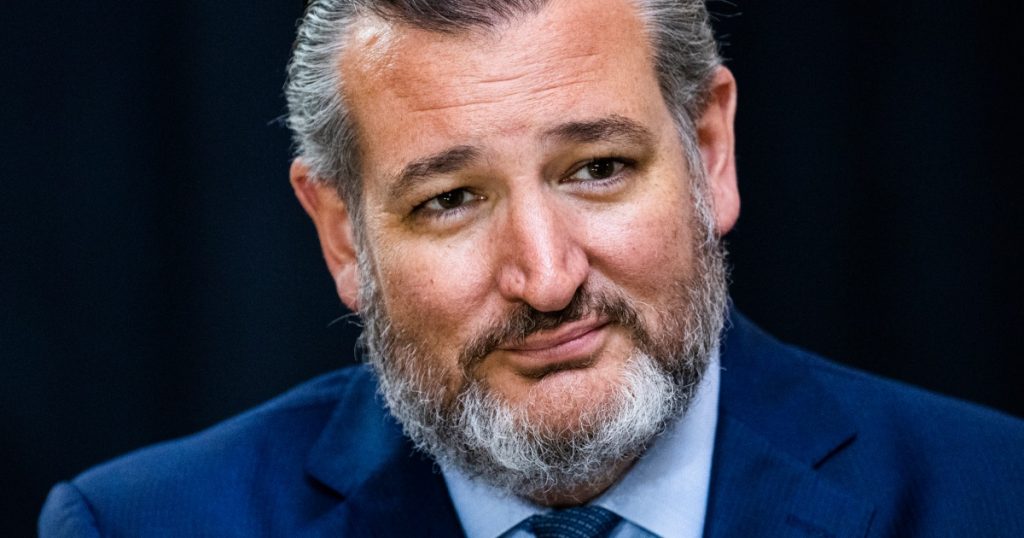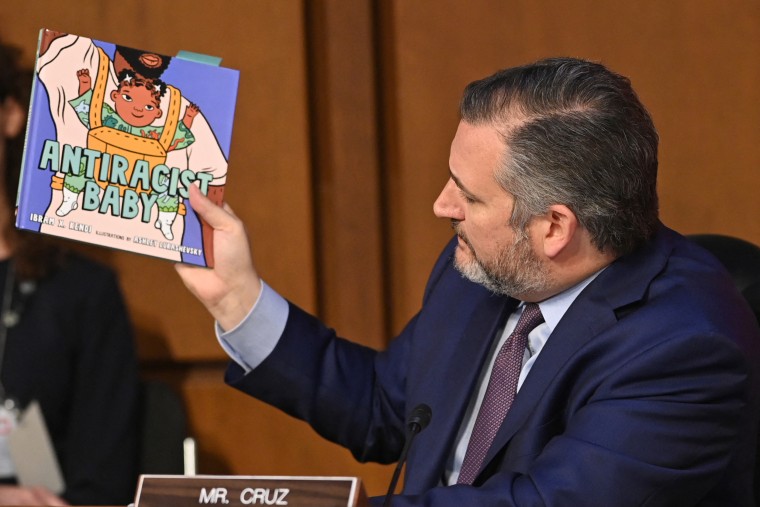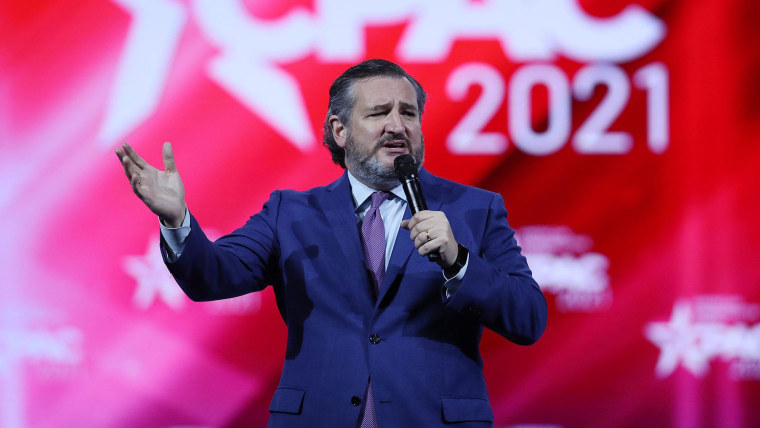
WASHINGTON — Sen. Ted Cruz built his reputation as a conservative flamethrower after leading the government shutdown over Obamacare funding in 2013, cultivating that brand during his presidential campaign and beyond over the last decade.
Now, the Texas Republican is seeking to show some bipartisan credentials as he runs for re-election in a state that is becoming more competitive and gave him a scare in his last race.
In a wide-ranging interview in his Capitol Hill office, Cruz highlighted his work as the top Republican on the Commerce, Science and Transportation Committee and how he’s teamed with Chair Maria Cantwell, D-Wash., on legislation requiring that consumers be informed if their refrigerator or other home appliances have recording capabilities.
Cruz touted his work with Sen. Joe Manchin, D-W.Va., on a bipartisan bill to fight a potential ban on new or existing gas stoves.
And he spoke of his unlikely partnerships with two other Senate Democrats on the Commerce committee — Ben Ray Lujan of New Mexico and Rafael Warnock of Georgia — to help create new interstates that will boost trade and business in their states.
“Oversight is one large bucket” for the committee, Cruz said. “And then the other large bucket is positive, bipartisan legislation that can move, that can pass into law, that is pro-jobs and pro-growth. And the Commerce Committee has a long history of passing legislation like that.”
As Cruz sees it, his new perch as ranking member of the Commerce committee will be a boon for fellow Texans — and, in turn, beneficial for his re-election campaign. The panel covers many key industries that have “deep footprints” in the Lone Star State, he said, from space and airlines to telecom, tech and energy.
“I think campaigns should be about issues and substance and results,” Cruz said, sitting in his Russell Senate Building Office, where three of his bills that President Barack Obama signed into law hang on the wall. “The Commerce Committee has vast jurisdiction over nearly half the U.S. economy. Having the responsibility of being the ranking member for the Commerce Committee is enormously beneficial to Texas.”
“It gives me the ability to fight for 30 million Texans in a way that has real, meaningful impact,” he added.
Tricky balancing act
Cruz’s new posture comes after he survived a near miss in his 2018 campaign, edging out Democratic rival Beto O’Rourke by a mere 2.6 points in the Republican stronghold. O’Rourke spent his campaign belittling Cruz as “all talk and no action” — a senator who’d spent six years slinging partisan arrows and delivering nothing for Texas.
To some Texans, it rang true. Cruz lost independent voters to O’Rourke in that contest, according to NBC News exit polls.
Cruz developed a reputation as a pugnacious partisan in his first year when he spurred a 17-day government shutdown in 2013 that many Republicans wanted to avoid and which failed to dismantle the Affordable Care Act. Three years later, Sen. Lindsey Graham, R-S.C., memorably quipped that someone could kill Cruz on the Senate floor and no senator would vote to convict them.
Now, facing an unpredictable cycle that lands in a presidential election year, Cruz is trying to get ahead of those inevitable attacks from Democrats. But it’ll be a tricky balancing act to stay true to his right-wing firebrand persona while also trying to reach out to the types of swing voters who nearly sent him packing in 2018. Cruz has shown that side of him in recent days by blasting the indictment of former President Donald Trump as the work of a “left-wing Soros prosecutor” who is “making a mockery of the rule of law.”

In his successful 2022 re-election campaign, Democratic Sen. Raphael Warnock barnstormed Georgia touting his work with Cruz to bolster the I-14 corridor in the South — often drawing gasps from his liberal crowds.
Now, it’s Cruz’s turn to do the same.
Cruz recalled getting the bill over the finish line. “Tom Carper from Delaware said, ‘Well, if Cruz is for it and Warnock is for it, we ought to all be for it’ — and it passed unanimously to peals of laughter!”
And last year, Cruz and Lujan successfully tucked language in a spending package that designates a portion of the Ports-to-Plains Corridor, from Laredo, Texas, to Raton, New Mexico, as a future interstate route — a critical step toward adding the 830-mile stretch to the U.S. Interstate Highway System. The pair have rolled out a separate bill that would name the corridor Interstate 27.
“My experience with Sen. Cruz is we’ve always worked together,” said Lujan, who for two cycles served as House Democrats’ campaigns chief.
After Lujan suffered a stroke last year, he said Cruz would often check in to see how he was doing. “It’s just a reminder, say hello to people, get to know them,” Lujan said. “You never know where you’re gonna find partnerships.”
‘Ted is Ted’
But skeptical Democrats on the Commerce panel still view Cruz as a partisan attack dog. Asked about Cruz’s bipartisan work on the refrigerator and appliance privacy bill, Sen. Brian Schatz, D-Hawaii, literally rolled his eyes.
“I just haven’t seen any evidence that Ted has changed,” Schatz said. “There’s not a single one of us that doesn’t have one or two bipartisan bills. The question is: How do you behave on a daily basis? And I just haven’t seen a big change. Maybe I’m wrong, and I’d be happy to be proven wrong, but so far it seems like Ted is Ted.”
David Bergstein, a spokesman for Democrats’ Senate campaign arm, was more blunt: “Cruz is one of the most vitriolic, least productive, bombastic, self-absorbed members of the U.S. Senate. The idea that he’s a productive working member is laughable to the people of his state.” Bergstein said the committee will “look for opportunities” to put Republicans on defense “in states like Texas.”
At times, Cruz offered a broad definition of bipartisan successes, counting among them the scuttling of two of Biden’s nominees — for which he’s claimed credit. Last month, Phil Washington, Biden’s choice to lead the Federal Aviation Administration, dropped his nomination after Cruz attacked him as unqualified on aviation safety issues and Democrats couldn’t muster enough support within their ranks to advance his nomination out of the Commerce panel.
Weeks earlier, Gigi Sohn, Biden’s pick for the Federal Communications Commission, also withdrew her nomination after all Republicans and a handful of Democrats threatened to reject her. Cruz had pointed out that Sohn had made donations to a group that had attacked some key senators, including Manchin and Sinema.
“At the end of the day, Republicans agreed and several Democrats agreed with us as well,” Cruz said.
2024 will ‘not be boring’
Cruz’s prospects for re-election will depend in part on who his party’s presidential nominee is. The Republican victory margin in Texas has shrunk from 16 points in the 2012 presidential election to 9 points in 2016 to less than 6 points in 2020. Yet Cruz, the runner-up to Trump in the 2016 race, is resolute about staying agnostic in the 2024 primary.
Asked what advice he’d give to Trump’s rivals, Cruz chuckled. “I am not in the business of giving advice,” he said. “To candidates running for president right now — I have every confidence we will have a wild and wooly primary. My focus is on running for re-election to the Senate in the state of Texas. And I have absolute certainty the presidential race will not be boring.”
Meanwhile, multiple former Cruz staffers have gone to work for Florida Gov. Ron DeSantis, who is seen by many as the main GOP alternative to Trump. The senator said it simply speaks to the quality of his political team. “We came in second in 2016,” he said. “We came very, very close to winning altogether. That team is tremendously talented.”
Cruz and DeSantis, a former member of the far-right House Freedom Caucus, were both first elected to Congress in 2012 and spent the next few years as troublemakers. Asked if he believes DeSantis would make a good president, Cruz grinned.
“Good try,” the usually loquacious senator said. “I think the voters will make that determination.”
 Latest Breaking News Online News Portal
Latest Breaking News Online News Portal






